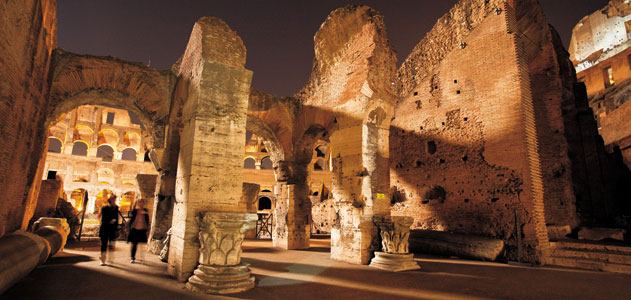| Author |
Message |
    
Rome and Empire
| | Posted on Sunday, March 20, 2011 - 01:36 pm: | |
What's underneath the Colosseum?
 (interactive - click image for article) (interactive - click image for article)
Secrets of the Colosseum: A German archaeologist has finally deciphered the Roman amphitheater's amazing underground labyrinth (see 360 degree imbedded) - Smithsonian, Jan. 2011
quote:"Following the executions came the main event: the gladiators. While attendants prepared the ritual whips, fire and rods to punish poor or unwilling fighters, the combatants warmed up until the editor gave the signal for the actual battle to begin. Some gladiators belonged to specific classes, each with its own equipment, fighting style and traditional opponents. For example, the retiarius (or “net man”) with his heavy net, trident and dagger often fought against a secutor (“follower”) wielding a sword and wearing a helmet with a face mask that left only his eyes exposed.
Contestants adhered to rules enforced by a referee; if a warrior conceded defeat, typically by raising his left index finger, his fate was decided by the editor, with the vociferous help of the crowd, who shouted “Missus!” (“Dismissal!”) at those who had fought bravely, and “Iugula, verbera, ure!” (“Slit his throat, beat, burn!”) at those they thought deserved death. Gladiators who received a literal thumbs down were expected to take a finishing blow from their opponents unflinchingly. The winning gladiator collected prizes that might include a palm of victory, cash and a crown for special valor. Because the emperor himself was often the host of the games, everything had to run smoothly. The Roman historian and biographer Suetonius wrote that if technicians botched a spectacle, the emperor Claudius might send them into the arena: “[He] would for trivial and hasty reasons match others, even of the carpenters, the assistants and men of that class, if any automatic device or pageant, or anything else of the kind, had not worked well.” Or, as Beste puts it, “The emperor threw this big party, and wanted the catering to go smoothly. If it did not, the caterers sometimes had to pay the price.”
Rough Roman justice, "pay the price", but that was the cost of Empire in the Classical world. Today we have 'Reality TV'. Back then, it was the Colosseum's bloody reality 'war games' of Imperial Rome.
I. |
|